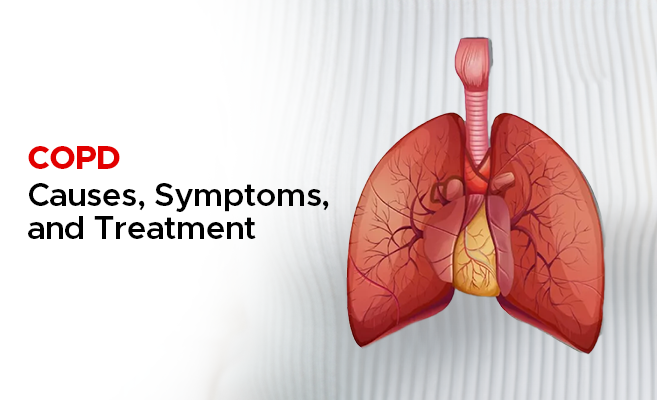Chronic Obstructive Pulmonary Disease (COPD) is a progressive lung condition that impacts millions worldwide, making it challenging to breathe over time. It typically results from prolonged exposure to irritants like cigarette smoke, air pollution, or occupational chemicals. Unfortunately, COPD is currently not curable. However, with timely intervention, personalized treatment strategies, and lifestyle changes, patients can significantly slow disease progression, enhance their quality of life, and manage symptoms effectively.
COPD encompasses several respiratory conditions, with emphysema and chronic bronchitis being the most common. Managing the condition requires a combination of medical care and lifestyle adaptations. If you or a loved one is looking for COPD Treatment in Patiala, it is essential to work closely with specialists who focus on both immediate relief and long-term wellness. This article provides an in-depth look at COPD treatment goals and practical tips for long-term management.
Understanding COPD Treatment Goals
The primary objective of COPD treatment is to alleviate symptoms, prevent exacerbations, and improve the patient’s overall well-being. Although the disease itself cannot be reversed, treatments aim to enhance lung function, allowing patients to lead active and comfortable lives. Here are the core goals of COPD management:
- Symptom Control: Medications and therapies are prescribed to reduce breathlessness, chronic cough, and mucus production.
- Prevention of Exacerbations: Managing triggers such as smoking, pollution, and respiratory infections helps avoid sudden worsening of symptoms.
- Improved Exercise Tolerance: Physical activity is encouraged to strengthen respiratory muscles and boost energy levels.
- Prevention of Disease Progression: While COPD advances over time, early interventions can slow the rate of decline in lung function.
- Psychological and Emotional Support: Mental health is critical for patients managing chronic conditions. Therapies and counseling can help patients cope with stress, anxiety, or depression.
Key Treatment Options for COPD
A tailored treatment plan includes a combination of medications, lifestyle changes, and therapies. Here’s a closer look at the options that healthcare providers recommend:
- Bronchodilators: These medications help relax airway muscles, improving airflow and reducing breathlessness.
- Inhaled Corticosteroids: Prescribed to reduce inflammation in the lungs, these are often combined with bronchodilators for better results.
- Pulmonary Rehabilitation: This is a structured program involving exercise training, nutritional advice, and education, aimed at improving respiratory function.
- Oxygen Therapy: For patients with low oxygen levels, supplemental oxygen can improve quality of life.
- Vaccinations: Flu and pneumonia vaccines are critical for preventing respiratory infections that can worsen COPD.
- Smoking Cessation Programs: Quitting smoking is the most effective way to slow disease progression and enhance treatment outcomes.
Long-Term Management Tips for COPD
Effective long-term management of COPD is a collaborative effort between patients, caregivers, and healthcare professionals. Here are some practical strategies to help manage COPD effectively:
- Follow Medication Regimens: Take medications exactly as prescribed to maintain symptom control and prevent flare-ups.
- Monitor Symptoms Regularly: Keep track of breathlessness, cough severity, and mucus production. Report any changes to your healthcare provider promptly.
- Adopt a Healthy Diet: A balanced diet rich in fruits, vegetables, and lean proteins helps maintain energy levels and supports lung function.
- Stay Physically Active: Engaging in light exercises, such as walking or yoga, helps strengthen the lungs and boosts mental well-being.
- Avoid Environmental Triggers: Minimize exposure to air pollutants, dust, and chemicals that can irritate the lungs.
- Join Support Groups: Connecting with others dealing with COPD can provide emotional support and practical coping strategies.
Working with Asthma Specialists for Optimal Respiratory Care
Patients with overlapping conditions like asthma and COPD, often referred to as Asthma-COPD Overlap Syndrome (ACOS), benefit from specialized care. For those seeking professional guidance, Best Asthma Doctors in Patiala can offer comprehensive treatment strategies. Specialists in respiratory care focus on creating individualized plans to manage symptoms efficiently, reduce exacerbations, and improve quality of life.
Conclusion: COPD Management for a Better Quality of Life
While there is no cure for COPD, advances in medical treatments and proactive management strategies make it possible for patients to live active and fulfilling lives. Early diagnosis, consistent medical care, and lifestyle changes are essential to improving outcomes. Collaborating with experienced healthcare providers ensures that patients receive the most appropriate care, tailored to their needs and circumstances.
Patients are encouraged to focus on small, manageable lifestyle changes and adhere to prescribed treatments to prevent complications. With the right approach and support, managing COPD becomes less overwhelming, empowering individuals to maintain independence and enjoy life to the fullest.

